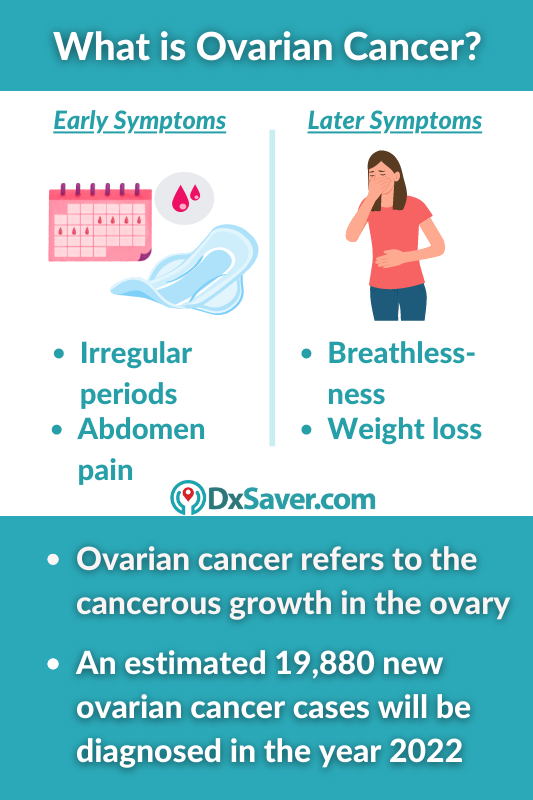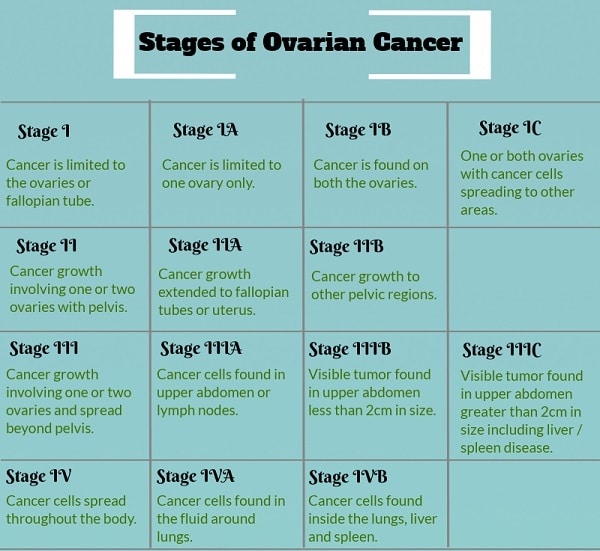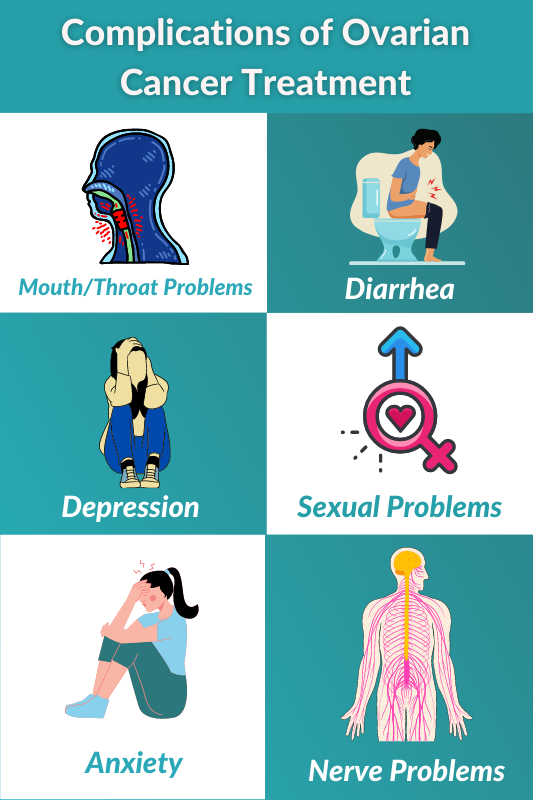
Do you know that ovarian cancer ranks 5th in cancer deaths among women in the United States? According to the American Cancer Society, an estimated number of 19,880 new ovarian cancer cases will be diagnosed and about 12,810 women diagnosed with ovarian cancer will die in the U.S. in the year 2022. Ovarian cancer mostly develops in older women who are above 60 years of age. So we highly recommend every woman above the age of 60 years to get tested for ovarian cancer screening test or CA 125 test (cancer antigen 125 test) at least once in every year.
The article covers all the important topics related to ovarian cancer like ovarian cancer screening test cost or CA 125 test cost, causes of ovarian cancer, different types, signs and symptoms, ovarian cancer stages, normal CA 125 range, and how to get tested for the ovarian cancer screening test.
- CA 125 test cost.
- Ovarian cancer testing
- What is ovarian cancer?
- What are the causes of ovarian cancer?
- Different types of ovarian cancer.
- Signs and symptoms of ovarian cancer.
- How is ovarian cancer diagnosed?
- Stages of ovarian cancer.
- Ovarian cancer treatment.
- Are there any side-effects in ovarian cancer treatment?
- Can ovarian cancer be cured?
- How to prevent ovarian cancer?
- Provider Locations.
For our readers, who are more interested in knowing the ovarian cancer screening test cost or CA 125 test cost beforehand, we would like to begin with that section.
How much does the CA 125 test cost?
CA 125 test costs $82 in different labs and facilities across the U.S. No prior appointment is required. Compare the price, order your test online and visit the nearest lab during lab business hours. Complete the procedure and get the results in your email in 2 to 3 business days.
The following table shows the CA 125 test cost at one of our partner with over 4500 laboratories (CLIA – Certified) network located across the U.S.
Name of our Partner Lab | Book Online |
Personal Testing Labs
| Offer Price$82 |
Ovarian cancer testing
Testing for ovarian cancer involves two steps.
1. Ovarian cancer screening test (CA 125 test):
CA 125 blood test is done to detect the presence of CA 125 protein in the blood released by the ovarian cancer cells. This test result may be positive or negative.
2. Ovarian cancer advanced testing:
When the CA 125 test results indicate the presence of cancer antigen 125, some advanced diagnostic tests like the pelvic exam, MRI, and CT of the abdomen and pelvis will be ordered by your physician to know the exact stage of ovarian cancer.
CA 125 test cost with insurance
Most of the insurance companies in the U.S. cover the cost of both the ovarian cancer screening blood test (CA 125 test) and advanced diagnostic tests. But, the coverage offered by private health insurance policies and national health insurance programs like Medicare and Medicaid varies widely. So we recommend you to check the coverage of your plan with the insurance company before getting tested for ovarian cancer.
Our ovarian cancer testing providers offer the screening test, CA 125 blood tests at the lowest cost, and do not accept any health insurance. But, in case, if the insurance company accepts to reimburse the CA 125 test cost, they can provide you with an itemized receipt containing all the details like the name and code of the test, and the CPT code that is required for insurance reimbursement purposes.

What is ovarian cancer?
Ovarian cancer is one of the most common cancers among women in the United States. It happens when abnormal cells grow in the ovaries, multiply rapidly, and form a tumor. Ovaries are the female reproductive glands. Previously, it was believed that ovarian cancer begins only in the ovaries but the recent evidence shows that it might also begin in the cells of fallopian tubes. Fallopian tubes are the tubes that help the eggs to travel from the ovaries to the uterus. In most cases, ovarian cancer goes unidentified until it spreads to the pelvis and abdomen.
If ovarian cancer is left untreated, the tumor can spread to other parts of the body called metastatic ovarian cancer.
What are the causes of ovarian cancer?
To date, it is not obvious what causes ovarian cancer. But doctors have identified the risk factors that increase the chances of getting ovarian cancer. Some of the risk factors are mentioned below.
- Older age between 50 and 60
- Inherited gene mutations
- Family history of ovarian cancer
- Estrogen hormone replacement therapy
- Starting menstruation at an early age or menopause at a later age
Different types of ovarian cancer
The ovaries are composed of three types of cells. The type of cell in which cancer begins, determine the type of ovarian cancer you have. The following are the different types of ovarian cancer.
1. Epithelial tumors
This type of tumor begins in the thin layer of the tissue that covers the ovaries outside.
2. Stromal tumors
This type of tumor begins in the tissue of the ovaries containing hormone-producing cells. Generally, these tumors are diagnosed at an earlier stage than other ovarian cancers.
3. Germ cell tumors
This tumor begins in the egg-producing cells. This is a rare type of ovarian cancer that occurs mostly in young women.
What are the signs and symptoms of ovarian cancer?
Most people with ovarian cancer do not experience any symptoms in their early stages. The early signs are similar to some common illnesses. The early signs of ovarian cancer include
- Pain in the pelvis or lower abdomen
- Back pain
- Frequent urinating
- Indigestion
- Pain during sexual intercourse
- Abdominal bloating
- Constipation
- Irregular periods
As cancer progresses over time, people with ovarian cancer will experience the following symptoms.
- Nausea
- Loss of weight
- Tiredness
- Fatigue
- Breathlessness
We recommend you to consult a physician immediately when you experience these symptoms for a significant period of time.
How is ovarian cancer diagnosed?
Generally, a screening test like the CA 125 blood test is done to diagnose ovarian cancer in the case of people not showing or experiencing any symptoms. The following are the tests used most often to detect ovarian cancer.
1. Cancer antigen 125 test (CA 125 blood test)
CA 125 blood test is a simple test taken using the blood sample that measures the amount of CA 125 protein in the blood. Because generally, women with ovarian cancer have elevated CA 125 levels. But checking CA 125 levels did not prove to be a successful screening test as high levels of CA 125 can also be caused due to some common conditions like the pelvic inflammatory disease.
2. Pelvic exam
During this pelvic exam, the physician inserts her gloved fingers into the vagina and presses the abdomen simultaneously to feel the pelvic organs. She also visually examines the vagina and cervix.
3. Transvaginal ultrasound (TVUS)
TVUS is a test that uses a small probe to look at the ovaries, uterus, and fallopian tubes using sound waves. This test helps in finding the mass or tumor in the ovary but it cannot tell whether the mass is cancer or benign.
Better screening tests for ovarian cancer are still being researched, but currently, there are no reliable screening tests.
In addition to the above-mentioned tests, your physician might also recommend some other imaging tests like MRI and CT of the abdomen and pelvis to determine the size, shape, and structure of the ovaries.
Ovarian cancer stages
Once you have been diagnosed with ovarian cancer, the stage of ovarian cancer will be determined during the time of surgery. Your physician will let you know the stage if cancer has been spread outside the ovaries. There are four stages of ovarian cancer, Stage I (early stage) to Stage IV (advanced stage). The diagnosis, monitoring, and treatment will be determined by the stage of ovarian cancer you have.
Various stages of ovarian cancer are explained in the info-graphic below.

How to treat ovarian cancer?
Once you have been diagnosed with ovarian cancer, your physician will decide the treatment depending on the stage of ovarian cancer. Most often, you will have several treatments at the same time. The following are the key treatments done to treat ovarian cancer.
1. Surgery
Surgery is the most common method for treating ovarian cancer. It is the removal of cancerous tissues in an operation. Most women with ovarian cancer will have surgery at least once during the course of their disease. There are three techniques of surgery namely initial surgery, second-look surgery, and surgery for recurrent cancer.
2. Radiation therapy
Radiation therapy is a rare treatment used for ovarian cancer in the United States. This therapy uses high-energy X-rays to kill cancer cells.
3. Chemotherapy
Chemotherapy is a cancer treatment that uses chemicals (drugs) to kill fast-growing cells including cancerous cells. This treatment is generally used after surgery to kill the cancer cells that might remain. Chemotherapy drugs can either be pills you take or medicines injected into the veins.
4. Targeted therapy
Targeted therapy uses some medicines to target the specific vulnerabilities present within the cancer cells. These drugs are usually reserved for treating cancer that returns after the initial treatment or cancer that opposes other treatments. This is an active area of cancer research as many clinical trials are testing new targeted therapies. Clinical trials are nothing but research studies done to improve health and cancer care.
Are there any side effects in ovarian cancer treatment?
Treatments involving drugs can cause physical, emotional, and/or psychological side effects. Inform your physician when you notice them. The following are the most common side-effects caused due to ovarian cancer treatment.
- Anxiety
- Depression
- Diarrhea
- Fatigue
- Anemia
- Hair loss
- Infertility
- Mouth and throat problems
- Nausea
- Vomiting
- Body pain
- Sexual side effects
- Skin irritation
- Nerve and muscle problems

Can ovarian cancer be cured?
Ovarian cancer is curable only when it is diagnosed at an early stage. However, it also depends on the stage of ovarian cancer and how far it has spread. It is hard to cure when it has spread beyond the ovaries.
How to prevent ovarian cancer?
To date, there are no proven ways to prevent cancer. But certain factors may lower the risk of getting ovarian cancer. They are
- Taking birth control pills – Women who took oral pills for 3 or more years are 30% to 50% less likely to develop ovarian or fallopian tube cancer.
- Breastfeeding – A recent survey has proven that the longer the woman breastfeeds, the lower risk of ovarian or fallopian tube cancer.
- Pregnancy – The more full-term pregnancy a woman had, the lower the risk of her having ovarian or fallopian tube cancer.
- Surgical procedures – Women who removed the uterus or have the fallopian tubes tied or closed to prevent pregnancy are at a lower risk of developing ovarian or fallopian tube cancer.
Provider Locations
The ovarian cancer screening tests can be done in any of the following locations across the U.S. by visiting the nearest lab. To know the CA 125 test cost, refer to the first section of the article.
- Alabama
- Arizona
- Arkansas
- California
- Colorado
- Connecticut
- Delaware
- Florida
- Hawaii
- Georgia
- Idaho
- Illinois
- Indiana
- Iowa
- Kansas
- Kentucky
- Louisiana
- Maine
- Michigan
- Minnesota
- Mississippi
- Missouri
- Montana
- Nebraska
- Nevada
- New Hampshire
- New Mexico
- North Carolina
- North Dakota
- Oklahoma
- Oregon
- Pennsylvania
- Puerto Rico
- South Carolina
- South Dakota
- Tennessee
- Texas
- Utah
- Vermont
- Virginia
- Washington
- West Virginia
- Wisconsin
- Wyoming
Frequently Asked Questions
Will insurance cover my testing cost?
No, insurance will not be covered in the billing. However, they will provide you a receipt for insurance reimbursement purposes.
How should I book my appointment?
You can choose the most suitable provider from above and make an appointment by following the instructions mentioned by them.
Can I cancel my lab test order?
Yes, you can cancel your lab test order anytime before your testing. A refund will be initiated after deducting the cancellation fee. However, cancellation is at the discretion of the provider.
Do the providers offer result interpretations?
Yes, a few providers may provide doctor consultation who will take you through the results and provide clarification if needed.
How do I receive my report?
To ensure your privacy, the test report will be mailed to you by the provider.
Other topics you may be interested in:-
- How Much Does At-Home COVID-19 Home Test Kit Cost in the U.S?
- Genital Herpes Symptoms in Women
- At-Home Chlamydia Testing Cost in the U.S.
- Cost of Cervical Cancer Screening Test in the U.S.
- Eye Chlamydia Symptoms
- Luteinizing Hormone, LH Test Cost in the U.S.
- STD Testing Cost in Austin, Texas
- CEA Test Cost in the U.S.
- Is Bruising a Symptom of STD?
- Cost of Estrogen Test in the U.S.
- How much does the Gonorrhea Test Cost in the U.S?
- Vitamin B12 Test Cost in the U.S.
- Do STDs Spread Via Kissing?
- Cost of LDH Test in the U.S.
- Follicle Stimulating Hormone, FSH Testing Cost in the U.S.
- How much does ESR Test Cost in the U.S?
- Causes of Penile Rashes and Other STD Symptoms in Men
- Oral STDs: Names, Symptoms, Treatment and Testing Cost
- Importance of Ferritin Hormone, Normal Levels, Diagnosis & Treatment
- What is D-Dimer Test? Know more on Normal Levels, Diagnosis & Treatment





